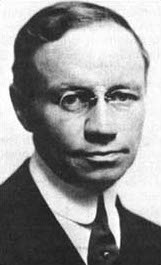
Back هيربيرت كرولى ARZ Herbert Croly German Herbert Croly Spanish Herbert Croly French 허버트 크롤리 Korean Herbert Croly Polish எர்பெர்ட்டு குரோலி Tamil
Herbert David Croly | |
|---|---|
 | |
| Born | January 23, 1869 Manhattan, New York City, U.S. |
| Died | May 17, 1930 (aged 61) |
| Alma mater | City College of New York Harvard University |
| Occupation(s) | Journalist, Magazine Editor, Author, |
| Known for | Political philosophy, intellectual leadership of the Progressive Movement |
| Political party | Republican[1] |
| Spouse | Louise Emory |
| Father | David G. Croly |
Herbert David Croly (January 23, 1869 – May 17, 1930) was an intellectual leader of the progressive movement as an editor, political philosopher and a co-founder of the magazine The New Republic in early twentieth-century America. His political philosophy influenced many leading progressives including Theodore Roosevelt, Adolph Berle, as well as his close friends Judge Learned Hand and Supreme Court Justice Felix Frankfurter.[2]
His 1909 book The Promise of American Life looked to the constitutional liberalism as espoused by Alexander Hamilton, combined with the radical democracy of Thomas Jefferson.[3] The book influenced contemporaneous progressive thought, shaping the ideas of many intellectuals and political leaders, including then ex-President Theodore Roosevelt. Calling themselves "The New Nationalists", Croly and Walter Weyl sought to remedy the relatively weak national institutions with a strong federal government. He promoted a strong army and navy and attacked pacifists who thought democracy at home and peace abroad was best served by keeping America weak.
Croly was one of the founders of modern liberalism in the United States, especially through his books, essays and a highly influential magazine founded in 1914, The New Republic. In his 1914 book Progressive Democracy, Croly rejected the thesis that the American liberal tradition was inhospitable to anti-capitalist alternatives. He drew from the American past a history of resistance to capitalist wage relations that was fundamentally liberal, and he reclaimed an idea that progressives had allowed to lapse—that working for wages was a lesser form of liberty. Increasingly skeptical of the capacity of social welfare legislation to remedy social ills, Croly argued that America's liberal promise could be redeemed only by syndicalist reforms involving workplace democracy. His liberal goals were part of his commitment to American republicanism.[4]
- ^ The House of Truth: A Washington Political Salon and the Foundations of American Liberalism, "A lifelong Republican and Roosevelt supporter, Croly had started the magazine partly as a counterweight to Hapgood's pro-Wilson Harper's Weekly........"
- ^ D. W. Levy (1985). Herbert Croly of the New Republic: the Life and Thought of an American Progressive. Princeton, NJ: Princeton University Press. ISBN 0-691-04725-1.
- ^ Croly, Herbert (2014). The Promise of American Life: Updated Edition. Princeton University Press. p. 237.
- ^ Kevin C. O'Leary (1994). "Herbert Croly and progressive democracy". Polity. 26 (4): 533–552. doi:10.2307/3235094. JSTOR 3235094. S2CID 147480352.